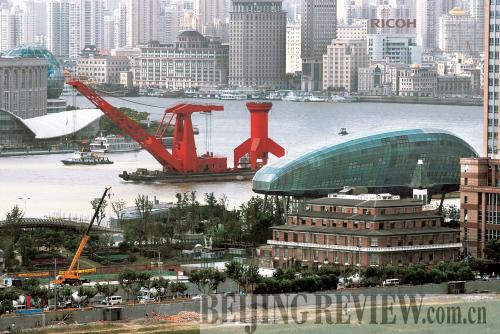|
 |
|
LINK TO THE WORLD: Shanghai will become an international shipping hub in the next decade. Pictured here is the Shanghai Port International Passenger Transport Center (JIN RONG/CFP) | An economic center, a financial center, a shipping hub, a manufacturing base and an international metropolis—each of them once served as the name card for Shanghai on China's prosperous eastern coast. But most recently, the city has adopted a new orientation—becoming an international financial center and shipping hub.
On April 29, the State Council promulgated the Proposals for Promoting Modern Services and Advanced Manufacturing Industries and Building International Financial and Shipping Centers in Shanghai. According to the proposals, China is aiming to make Shanghai an international financial center in accordance with the country's economic strength and the international status of its currency as well as a global shipping hub able to allocate international shipping resources by 2020.
From now on, Shanghai will work out an implementation plan and clarify specific measures and annual timetables to complete major tasks to ensure it reaches this goal by 2020, said Yang Xiong, the city's vice mayor, at a press conference on the same day the State Council released the proposals.
"Shanghai is the most qualified metropolitan city on the Chinese mainland to pursue the ambition of building international financial and shipping centers," Liu Tienan, Vice Minister of the National Development and Reform Commission (NDRC), said at the press conference.
Well-positioned
Shanghai boasts the most developed financial and shipping industries on China's mainland. Last year the city's financial industry generated added value of 144.26 billion yuan ($21 billion), a 15-percent increase over 2007. It is home to the largest number of financial institutions in China, which stood at 689 at the end of 2008. Of that, there were 124 commercial banks, 291 insurance companies and 94 securities companies. Of the total, 165 were foreign companies, and 57 had been licensed to offer renminbi-denominated services.
The Shanghai Stock Exchange, the first of its kind in China, was established in 1990 and had the world's seventh and Asia's second largest turnover in 2008. Earlier this year, Shanghai was selected as one of the five cities for a pilot program that uses the renminbi to settle cross-border trade.
The Shanghai port is one of the world's busiest ports. Its cargo throughput had been the world's largest since 2005, and reached 582 million tons last year. It also handled 28 million standard containers in 2008, ranking second in the world.
Shanghai's customs reported a total of $606.6 billion worth of commodity imports and exports last year, up 16.3 percent. Of that, imports increased by 10.3 percent to $213 billion, and exports rose 19.9 percent to $394 billion.
The pursuit of the "two centers," according to Yang, would give full play to Shanghai's comprehensive strengths, promote industrial upgrading, help transform Shanghai's development, and enhance its overall competitiveness and service functions.
The goal of turning Shanghai into a financial and trade hub is not new. Back in 1991, late Chinese leader Deng Xiaoping pointed out during a trip to Shanghai that China would have to rely on Shanghai to play an important role in the global financial arena. The following year, the 14th National Congress of the Communist Party of China adopted a goal of making Shanghai one of the country's international economic, financial and trade centers as soon as possible to promote the development of the Yangtze River Delta region and the cities along the Yangtze River.
Last July, the NDRC, related departments of the State Council, and the Shanghai Municipal Government mapped out a blueprint on how to promote the development of modern services and manufacturing in Shanghai and turn the city into an international financial and shipping center. The State Council approved the roadmap on March 25.
The plan's implementation is key to Shanghai's long-term development and economic transformation. More importantly, it reflects China's determination to advance further reform and opening up and industrial structure upgrading, and to continuously enhance the industrial competitiveness and overall national competitiveness despite the ongoing financial meltdown, Liu said.
Challenges ahead
Shanghai still has a few obstacles to overcome to become an international financial center, said Yang Tao, a researcher with the Institute of Finance and Trade Economics under the Chinese Academy of Social Sciences. First of all, most of China's national financial institutions are headquartered in Beijing, which, together with the imperfect securities markets has hindered Shanghai's pursuit of its goal, he said.
The Central Government has been very prudent in promoting the reform and opening up of the financial sector in terms of market-oriented interest rate and exchange rate reforms, the introduction of more financial derivatives products and the free convertibility of the renminbi. Yet it fears all this could create more risks within the financial system. This could be the largest obstacle, Yang said.
Liu Shijin, Deputy Director of the Development Research Center of the State Council, said Shanghai has to prudently address its relations with the entire Yangtze River Delta and other major cities. Located at the end of China's largest river, the Yangtze River, and the middle of China's only coastline, Shanghai enjoys several geographical advantages. The city has shouldered high expectations from the Chinese Government and ordinary people that it could help the delta region as well as the whole country to develop.
| 